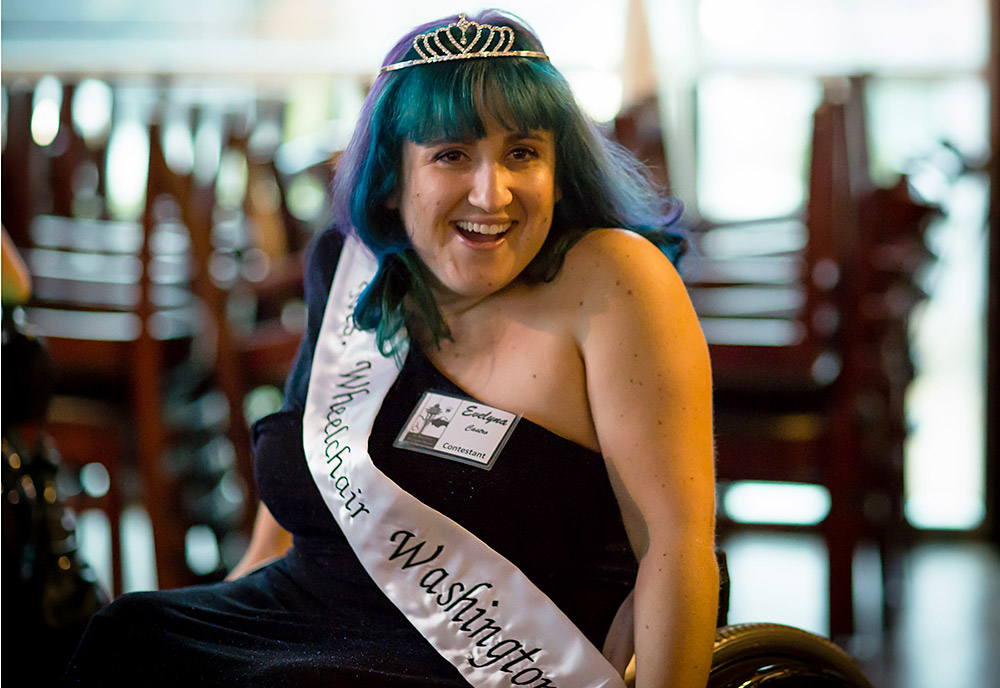Veterans Health Administration
Helping Beneficiaries Stricken with Spina Bifida

Ms. Wheelchair Washington: “Can’t thank the VA enough.”
When Evelyna Castro sees herself in a wheelchair she doesn’t think of herself as disabled. Instead, she has turned her disability into something positive.
Born with spina bifida, a debilitating spinal disorder that happens when a baby is in the womb and the spinal column doesn’t close all the way, Evelyna, 33, has refused to let her condition stand in her way. In fact, she was crowned Ms. Wheelchair Washington of 2014; her platform was Acceptance through Diversity. “Don’t let society or circumstances dictate your life,” says the Washington state resident and native of California.
In Colorado, Dick and Cindy Koons care for their daughter, also stricken with spina bifida and wheelchair bound.
What they and others like them share in common is the VA Spina Bifida Health Care Benefits Program, a federal program that covers health care considered medically necessary and appropriate for people with spina bifida (excluding spina bifida occulta). It is managed by the U.S. Department of Veterans Affairs’ Chief Business Office Purchased Care group in Denver, Colo. The beneficiaries are the birth children of Vietnam Veterans, and the children of certain Veterans who had served in Korea along the Demilitarized Zone, who have been diagnosed with the disorder as a result of the Veteran’s exposure to Agent Orange.
For Evelyna, a make-up artist, the program has been a godsend. “I can’t thank the VA enough, which has never refused me a thing,” she said. “Every five years I get a new wheelchair, among other services, and I can’t tell you how much that helps. Knowing they have my back relieves a lot of stress from my family and allows me to focus on my work.”
We were committed to loving her and giving her a chance to thrive.
For Dick and Cindy, the program has given their daughter, Melinda Marie, the opportunity to lead a quality life. “When Melinda was born forty years ago,” Dick said, “we were told that if she lived, she would probably be mentally retarded and we should consider institutionalizing her. Of course, we had no intention of giving up. We were committed to loving her and giving her a chance to thrive.”
The medical support provided by the program, including regular physical therapy and new wheelchairs when Melinda Marie needs one, gave the Koons family a tremendous sense of relief.
“Without their help, it would not have been possible for her to maintain her physical well-being,” Cindy added.
The program was enacted by Congress in 1997 once lawmakers were advised there was a connection between Agent Orange and spina bifida. Today, approximately 1,300 people have enrolled, and the program has evolved into a case management climate where VA is looking at better ways to help people stricken with the disorder get the care they need. Case management is a process that allows a manager to assist in facilitating the beneficiaries’ health care with a local medical provider and the program.
Program Provides Numerous Services for Beneficiaries
Ira King, a case management liaison at the VA Chief Business Office Purchased Care group in Denver, Colo., explains that they provide numerous services for the beneficiaries. “We connect them to local case management agencies,” he notes. “We find a full range of services in their local areas that include medical and mental health providers, pharmacies, medical equipment and supplies. We also work with providers of services to make sure spina bifida patients are not improperly billed.”
Thus far the case management liaison efforts have been successful and there is every indication that individual case management will expand further as more beneficiaries become aware of the service.
Equally important is that VA will continue outreach to those beneficiaries who may not be aware that the Spina Bifida Health Care Benefits Program exists. “We want them to know that we are here to help and to provide information and education to them, their caregivers, and providers of services,” King added.
For more information, visit www.va.gov/purchasedcare and click on Programs for Dependents on the left and then on Spina Bifida. Or call 1-888-820-1756.



















